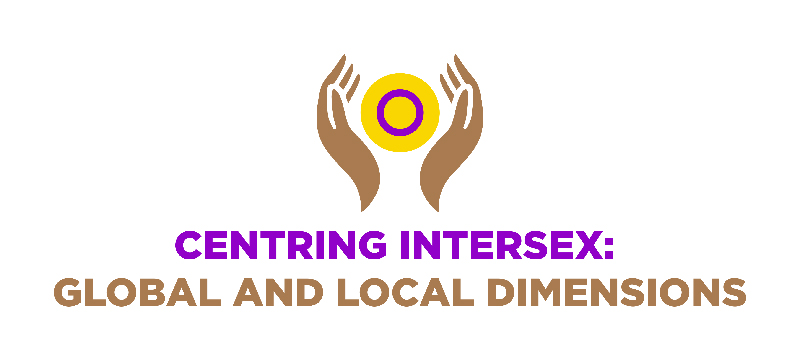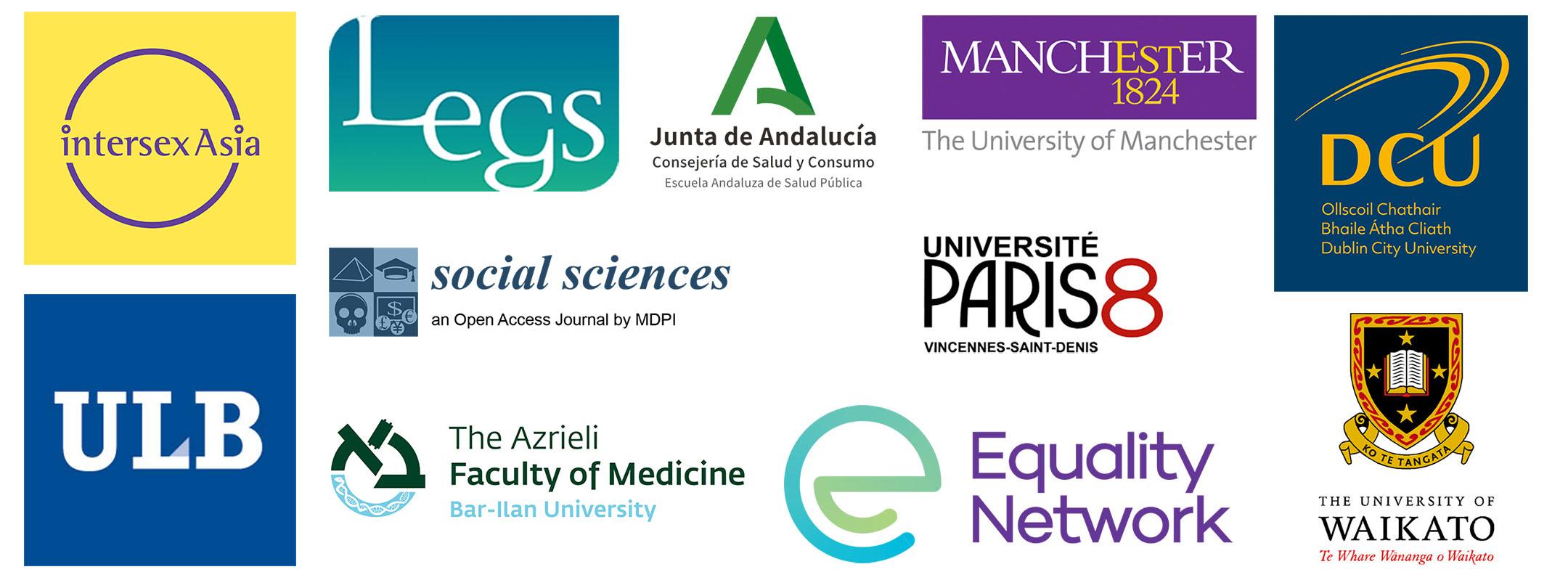
Centring Intersex: Global and Local Dimensions - International Conference

Organisers:
Adeline Berry (University of Huddersfield), Mauro Cabral Grinspan (Global Philanthropy Project), Morgan Carpenter (Intersex Human Rights Australia), Daniela Crocetti (independent scholar), Rebecca Crowther (Scottish Equality Network), Limor Danon (Bar-Ilan University), Fae Garland (University of Manchester) David Griffiths (University of Surrey), Morgan Holmes (Wilfrid Laurier University), Tanya Ni Mhuirthile (Dublin City University), Surya Monro (University of Huddersfield), Vasu Reddy (University of Pretoria), Loé Petit (Université Paris VIII-Saint Denis), Katrina Roen (University of Waikato), Amets Suess Schwend (Andalusian School of Public Health), Prashant Singh (Intersex Asia), Mitch Travis (University of Leeds).
Dates:
20-23 February 2023
Format:
Virtual to ensure global accessibility
Background:
Intersex people face social erasure and discrimination at every stage of their lives, from birth to old age. Babies who are born with noticeable intersex characteristics are usually operated on or subjected to other non-consensual medical treatments on infancy, early childhood or adolescence. There has been limited implementation of the Council of Europe Resolutions and the United Nations recommendations to stop these harmful non-consensual and unnecessary medical interventions on minors. Other key issues for intersex people and their families include a lack of inclusion in anti-discrimination legislation; bullying and erasure in schools (for example an absence of representation in school curricula); and high levels of direct discrimination and harassment in public places. Knowledge about the reasons for the lack of implementation of international human rights directives is needed, as is better understanding of intersex people’s needs regarding appropriate healthcare and related policy and practice reform. This conference provided a forum for knowledge generation and networking in these areas.
Intersex people are sometimes also trans. When an intersex baby is assigned to a gender they then cannot identify with, they may decide later to live in a different gender. While many intersex people identify as male or female, some identify as non-binary. Key issues may be shared, such as the importance of bodily autonomy and legal rights, but the ways these apply to intersex people and non-intersex trans people vary. The conference facilitated alliance-building and the recognition of diversities amongst intersex people and others.
Whilst a considerable amount of research has taken place about intersex issues, much of this is located in the global north. The conference took an international approach, foregrounding voices from the global south as well as the north. It brought in dimensions associated with postcoloniality, both in interrogating the historical construction of intersex and its medicalisation in the global north, and in addressing issues concerning intersex and variations of sex characteristics in the global south. In this way, it aimed to shift the field of intersex studies forwards, whilst also complementing existing activist and scholarly networks that are international and/or based in the global south.
The conference aims:
The conference facilitated the ongoing development of an international network of scholars, students, and stakeholders with an interest in supporting intersex people’s equality, wellbeing, and social and economic success. It generated original knowledge across a range of fields and academic disciplines. The conference also generated improved policy advice for key stakeholders especially those in policy and practice positions across sectors such as healthcare, education, and social work. The action also facilitated greater data collection by bringing scholars and other stakeholders together and showcasing research, both quantitative and qualitative.
Key themes:
- Alliance building and related political and policy analysis
- Human rights and activism
- Postcoloniality and global dynamics
- Identities: Complexities, intersectionalities, communities, and divergences
- Cultures, arts, and representations
- Service provision, including healthcare, education, social work, and community safety
- Policy making (including equality, diversity and inclusion, and sectors such as education, healthcare, and employment)
- Law
- Theory
Overall, the conference created an innovative international space for networking and scholarly activities. It was run as a collaboration with the HO2020-funded INIA project https://www.intersexnew.co.uk/, and a range of stakeholder organisations were invited to take part. Outputs from the conference will include a Special Edition of the international journal Social Sciences.
Conference organisation:
The conference had multiple streams to address (for example) healthcare issues; family and community; rights and legal issues; identity and cultural representations; social policy and practice issues; and activism and alliances.
Programme - Centring Intersex Issues Conference
Fair Processing Notice for Conference Delegates
Use of contact details:
The University of Huddersfield collected your name and email address in order to organise the Centring Intersex conference, for example to send you the conference programme. The data collected for this conference registration was used by the University of York to enable them to contact delegates to register on a form provided by the COST network which is part-funding the conference. It will not be shared further without your consent.
The data collected by the University of York was uploaded to the E-COST system. It will only be used by COST as proof of conference attendance. The E-Cost privacy notice is available here https://www.cost.eu/legal/privacy-policy/.
The presentations:
The University of Huddersfield collected your pre-recorded conference presentations in order to provide the Centring Intersex conference. The reasons for prerecording presentations and making them available a few days before the conference were:
- So that people could watch asynchronously, given the international nature of the conference and the 24-hour schedule. It enabled people to join for Q&A at unsociable times having watched presentations in advance, therefore widening access.
- To help prevent technical problems such as load shedding, which could otherwise be very disruptive in an international online conference.
The presentations were edited together (without interference with the presentation submitted) into a panel format. These panels were available only to people who have registered for the conference to view a few days before the conference if wished. The papers were broadcast to attendees at the conference during the scheduled time for presentation. The presentations were held by the professional conference platform team (go-to GARVAN). The presenters retain copyright of their presentations. The presentations could not be downloaded. They were accessible to presenters for 2 weeks to enable them to look as many as they wish.
Some presentations may then be posted on the INIA website https://www.intersexnew.co.uk/ INIA project website, with permission of presenters.
The information was stored and used in accordance with the University’s privacy policy which you can find here.
Communications policy
For this conference, participants are free to informally discuss the information received outside of the conference, but neither the identity nor the affiliation of the speaker(s), nor that of any other participant, may be revealed.
This conference received financial support from the University of Huddersfield, the journal Social Sciences, and COST Action (European Cooperation in Science and Technology - EU funding) number CA19103
The conference was also supported by the INIA project, which has received funding from the European Union’s Horizon 2020 research and innovation programme under the Marie Skłodowska-Curie grant agreement No. 859869 “Intersex – New Interdisciplinary Approaches” (INIA). Communications in the conference reflected only the views of the author/s and, in relation to the INIA project, the funder is not responsible for any use that may be made of the information it contains.

